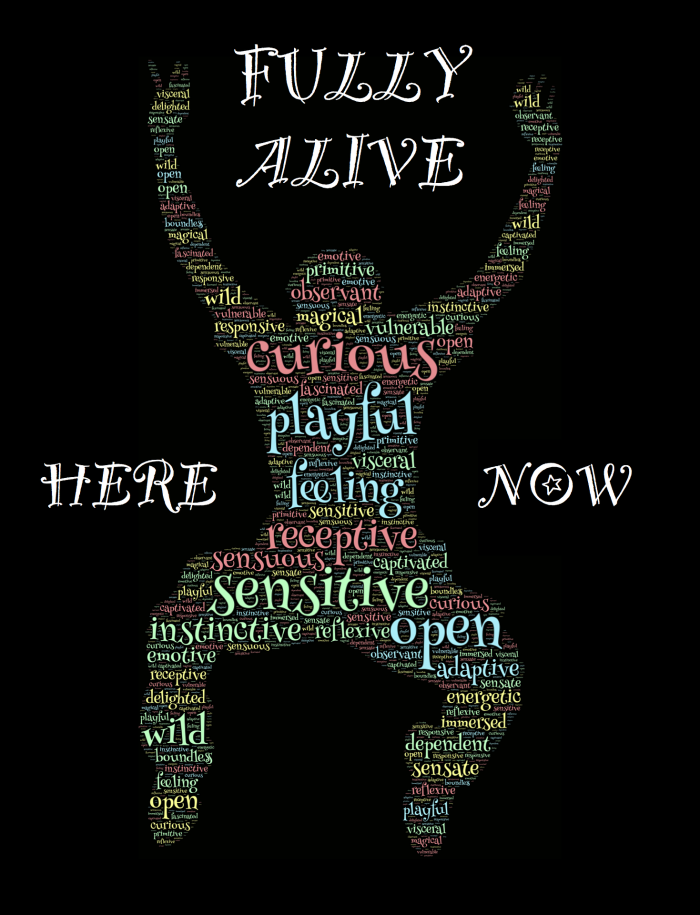If you think about it logically, it’s odd how we’re so used to having our attention focused on past and future, largely to the exclusion of the present. After all, the present is the only one that is, in fact, happening and that can be tangibly engaged right now — neither of which can be said for past or future.
Now is all there is, the only “time” and “place” in which life is ever happening. And yet we spend the vast majority of our time mentally engaging remembered or imagined pasts and futures, as opposed to actually encountering the moment we’re in.
From a logical perspective, shouldn’t it be the other way around? Shouldn’t we be spending the vast majority of life with our full attention engaged in the present, except for the occasional reminisce into past or future?
What is it about humanity at large — and each of us in particular — that causes us to operate in reverse of what would seem natural?
We can do virtually nothing about the past and future, besides to remember them positively or negatively, anticipate them anxiously, or fret and worry about them.
Yet there’s plenty we can see, feel and do in the present moment. Still, whereas we could choose to be fully engaged in the moment before us in its full, alive, three-dimensional color and splendor, we so rarely exercise this awareness. Instead, we almost always opt for the concerns and worries of another moment — one that we’re not even able to actively engage now, but only to think and brood about.
Why? What’s the big draw? Do we actually enjoy the state of low or high level anxiety all this thinking about past and future puts us in? No we don’t, that’s the irony! But I’ll tell you why we do it. It’s because it lets us feel like we get to manage our lives and be in control of how things shape up. Which is all a big illusion anyway. Our internal dialogue and thoughts and worries about what has happened or may happen does nothing to change what actually did or will happen.
It’s just appealing to run to our thoughts about something difficult that happened because it lets us avoid feeling it. Say we’ve been emotionally wounded in a relationship, for example. If we allow, feel and accept that pain right now instead of spinning our mental stories about it, we are being present with it. I.e. alive, now, in this moment.
But what are we being present with? Emotional pain. Ouch, that’s not easy. Which is exactly why our first impulse is to run to our thoughts about it, where we can hold that pain a safe distance away by thinking about it instead of feeling it. While thinking about something painful is unpleasant, it actually hurts less than feeling it.
Same goes for worrying about a future event. Say we have an upcoming exam, for example. Instead of just being in the moment and feeling whatever anxiety comes up concerning the upcoming exam, we rehash thoughts about how bad it would be to fail the exam, how difficult the subject matter is and the like. Anxiety is so hard to sit with, so what do we do? We run to the “safety” of our minds where we can fret and worry about the test. While doing so is not fun, it actually distracts us from feeling the anxiety.
But in both of the above scenarios we pay a big price for escaping to thoughts about the past and future to avoid feeling the emotion of the moment. It would be one thing if escaping on a past or future trip around a difficult emotion actually got rid of the emotion. But it doesn’t. The hurt, fear or other difficult emotion that drove us to escape the moment is still there, still waiting to be met. We didn’t actually escape it, so it continues to repeat itself, and we continue feeling compelled to escape it by running to past and future thoughts about it, ad infinitum.
So what we end up losing is not the emotion, but the opportunity to come to terms with the emotion or experience by feeling what it’s bringing up in us right now. You see, as soon as we’re in mind we’re thinking. Which means we’re no longer feeling. Which means we’re no longer connected to our self, since it resides in the present moment. And so we allow the emotion to keep us from being alive to the only reality we actually have, the present moment reality.
When we drop thought, we return instantly to what’s here, before us, just waiting to be lived.
When we live in the past and future, we are essentially in a fog. When we live in the present, we are actually experiencing life in its aliveness. It’s like the difference between one-dimensional vs. three-dimensional reality.
That’s not to say life lived in the present is all fun, easy and a continual shower of rose petals. Difficulties and challenges arise when we stick around “here” long enough to give them our attention. Unpleasant, boring and uncomfortable situations have to be dealt with. Tough decisions must be made. Painful feelings ask to be faced.
These vulnerable moments are the moments when mind quickly jumps in to entice and tempt us to believe that it can manage things better than life is already doing. That it can maneuver a safer, more comfortable and more pain-free passage through life on our behalf. Lies!
In reality, all it can do is take us to its fake, stale, make-believe world where we find ourselves ensnared in a loop of thinking, fretting and brooding over what has happened or will happen, instead of meeting what’s here now with trust, awareness and vivacity.







Read 0 comments and reply